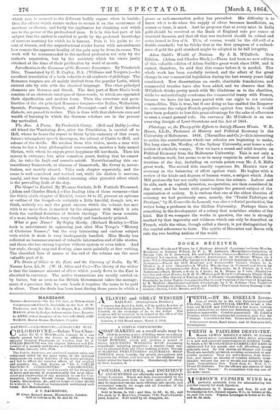Plutology; or, the Theory of the Efforts to Satisfy Human
Wants. W. E. Hearn, LL.D., Professor of History and Political Economy in the University of Melbourne. 1864. (Macmillan and Co.)—It is interesting to notice the contributions which our colonies are beginning to make. Not long since Dr. Woolley, of the Sydney University, sent home a col- lection of scholarly essays. Now we have a sound and solid treatise on Political Economy from the Melbourne University. This is not only a well-written work, but seems to us in many respects in advance of the treatises of the day, including on certain points even Mr. J. S. Mill's great work. The second title exactly expresses Dr. Hearn's view of economy as the balancing of effort against want. He begins with a review of the kinds and degrees of human wants, a subject which John Mill professedly but not really banishes from the science. Labour and its aids, such as capital, invention, co-operation, are then considered in due order, and he treats with great insight the general subject of the organization of society. It is curious that one of the ablest theories of economy we had previously seen, namely, the "Traitd Thdorique et Pratique," by M. Courcelle de Leneuil, was also a colonial production, the writer being a professor in the Chilian University. Perhaps there is something in the development of a colony that nourishes studies of the kind. But if we compare the works in question, the one is strongly marked by that ingenuity and wildness which can only be described as French, while the 'other, though called a theory, is yet distinguished by the careful adherence to facts. The spirits of Descartes and Bacon still rule the two leading nations of the world.






























 Previous page
Previous page